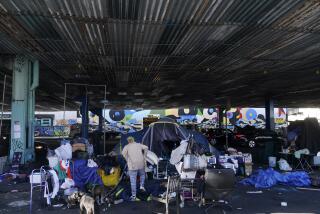Court Rejects Burbank Ban on Rock Concerts
- Share via
WASHINGTON — The Supreme Court refused today to disturb a lower court ruling that said the First Amendment right to free speech prevents a community from banning rock ‘n’ roll concerts.
The justices rejected the appeal of the city of Burbank, Calif., which challenged a court order to pay more than $145,000 to a concert promoter after it tried to ban “hard rock” from a city-owned outdoor amphitheater.
Burbank signed a contract with Cinevision Corp. in 1975 giving it the exclusive right to present live entertainment in the Starlight Bowl during summer months.
The city and Cinevision owners got along well until 1979, when the City Council vetoed six of nine rock groups proposed by the company. The banned performances were by Blue Oyster Cult, Jackson Browne, Roxy Music, Todd Rundgren, Patti Smith and Al Stewart.
Protected Expression
Cinevision filed suit for civil rights violations and breach of contract and was awarded $25,000 in damages and $119,000 in attorney fees after the 9th U.S. Circuit Court of Appeals ruled that music, including rock ‘n’ roll, “is a form of expression that is protected by the First Amendment.”
The city, in its appeal, argued it had the contractual right to prevent performances by any group that might attract “late night, rowdy behavior, vandalism and excessive alcohol and narcotics use.”
“No court has ever held that a piece or style of music by itself--without specific lyrics--constitutes expression protected by the First Amendment,” lawyers for the city told the high court.
Residents Complain
The Burbank council voted to restrict the types of performances at the theater only after receiving many complaints from residents near the bowl who feared Cinevision “was converting their little community amphitheater into a regional rock center and ruining their neighborhood,” the city lawyers said.
Cinevision’s lawyers urged the court to uphold the jury’s verdict, which they said was based on a finding that the basis for banning rock groups was “an inchoate fear of what City Council members thought a rock ‘n’ roll artist might sing or portray to those who came to a concert.”
Other Decisions
In other cases today, the justices:
--Agreed to decide whether prosecutors may disqualify any potential juror from a criminal trial because of the juror’s race.
The justices said they will use a case from Louisville, Ky., to decide whether defendants are denied fair trials when prosecutors use such tactics.
--Refused to revive a lawsuit against the federal government involving the suicide of a soldier sexually harassed by her drill sergeant.
--Let stand a ruling that police officers need court warrants before they call criminal suspects out of their homes to arrest them.
More to Read
The biggest entertainment stories
Get our big stories about Hollywood, film, television, music, arts, culture and more right in your inbox as soon as they publish.
You may occasionally receive promotional content from the Los Angeles Times.










